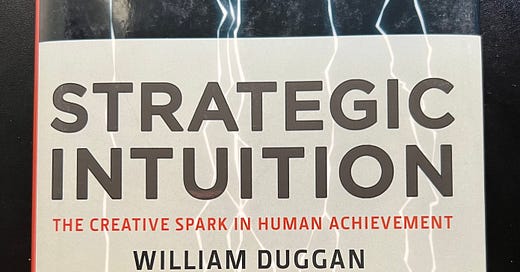📚 Wrestling With Intuition (Can You Cultivate Flashes of Insight?)
Book: Strategic Intuition: The Creative Spark in Human Achievement
Hello everyone,
In early 2009, David Tepper connected dots that would change his career forever. The US government had announced a new capital backstop for troubled financial institutions, yet investors were still shell-shocked and overly cautious. Markets failed to react.
Tepper had traded his way through the Asian financial crisis and the dotcom bust. He had experience investing in distressed assets, including banks during the S&L crisis. At that moment, things became clear to him. “The government told me in writing what it would do and at what prices,” he recounted.
When the white paper came out, the government tipped its hand. If the government was going to raise equity for the banks, it meant it was establishing a floor under the equity indicating at what price that floor was. Essentially the government was telling us that it wasn’t going to let the banks fail.
Tepper acted immediately and loaded up on the deeply discounted paper of various financial institutions.
Do I have to be a genius here? Normally one or two others are buying along. This time there was no one - not even the guy in Omaha.
He was rewarded handsomely for his flash of insight.
After writing about variant perception, I’ve been wrestling with the role of intuition. While experts benefit from intuition in stable environments, Kahneman and others have taught us not to trust our snap judgments, or system 1 thinking, in complex adaptive systems such as financial markets. And yet flashes of intuitive insight, eureka moments, seem to complement the methodical analytical process. Take two examples.
In 1992, after the head of the German Bundesbank had hinted at a devaluation of the British pound, Druckenmiller revisited the firm’s short position with Soros. Soros immediately recognized that the situation had changed, that it now presented a tremendous asymmetry, and that they had to act quickly. He pushed Druckenmiller to ‘go for the jugular’. Both of them worked the phones to increase the position. As I outlined in my post, a lot of analytical work had been done previously. But what made the trade legendary was Soros’s snap judgment.
For a value investing example, take a legendary Charlie Munger anecdote, his investment in distressed cyclical automotive supplier Tenneco (detailed write-up).
I read Barron’s for fifty years. In fifty years I found one investment opportunity in Barron’s, out of which I made about $80 million with almost no risk. I took the $80 million and gave it to Li Lu, who turned it into $400-500 million. So I have made $400-500 million out of reading Barron’s for fifty years and following one idea.
… It was a little automotive supply company, a cigar butt. … it was the Monroe shock absorber, and all that stuff. The stock was a dollar, and the junk bonds were 35. I bought the junk bonds. They paid me the 35%, and they went right to 107 and they were called. And the stock went from 1 to 40, but of course I sold my stock at 15.
[Audience:] What did the article in Barron’s say?
[Munger:] It said it was a cheap stock!
[Audience:] How long did it take you to make the decision to buy it, once you read the article?
[Munger:] Oh, about an hour and a half. … I kind of knew, based on experience, how sticky some of that auto secondary market was. How many old cars needed Monroe shock absorbers. And I just knew it was too cheap. I didn’t know it would work for sure. As I say, people were afraid it was going to go broke, obviously, if their bonds were selling at 35.
Munger’s investment was built on five decades of cumulative knowledge and experience plus an “hour and a half” of research. It wasn’t instantaneous, but I would still call it a eureka moment.
Expert Intuition vs. Strategic Intuition
In Strategic Intuition: The Creative Spark in Human Achievement, author William Duggan of Columbia University explores eureka moments and paradigm changes in fields like science, technology, military, business, and the arts. He argues that great ideas, variant perceptions of a situation or a problem, “come to you as flashes of insight, often when you don’t expect them.”
He also draws a sharp distinction between what he calls strategic intuition and expert intuition.
As you get better at your job, you recognize patterns that let you solve similar problems faster and faster. That’s expert intuition at work.
Expert intuition relies on your own experience, while strategic intuition draws on the experience of everyone else in the world as well.
… Expert intuition makes you better at tactics, but what makes you better at strategy? Expert intuition works for familiar situations, but what about new ones? What good is expert intuition—drawing elements from the past—when the future is unpredictable?
Duggan draws on military strategy, neuroscience, and Eastern philosophy. He offers a simple four-step framework and examples including Napoleon, Microsoft, Google and Picasso. I found his book to be a very useful addition to the framework I’m working on. It also led me to ‘diffuse-mode thinking’, a proper term for what I called ‘put it down’ space in Cranking The Learning Machine Up To 11, that crucial yet seemingly unproductive time in between input and output. Alright, let’s dig in.
👉 The remainder of this post and the opportunity to reflect, share, and discuss in the comments are reserved for the community of subscribers who support my work. If you would like to join the conversation, consider subscribing.



